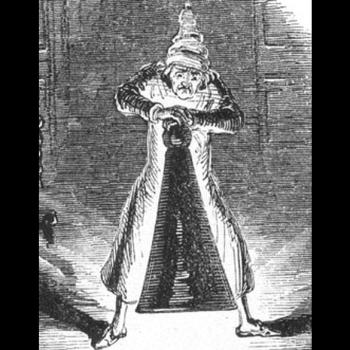Only a rejection of the current religious group-think will lead to a spiritual breakthrough.

If you are not concerned about hyper-religion in the church today, start now. We are doing what Jesus told us not to do. We should be very concerned that we are more pious than our religion’s founder. We have become like the Pharisees and Sadducees of Jesus’ day.
Years ago while I was working in Christian ministry, the leader liked to tell tales of piety. I remember one story about his saintly father who wore holes in the toes of his shoes after long hours of praying on his knees. A voice in my head warned me that this talk was breaking Jesus’ command to not boast about religious achievements — even when boasting about others — but I ignored that red flag and many others. In time, I perfected the holy art of bragging not only about other people’s acts of charity and religion, but also my own.
It’s a tiny step from being proud of others to being proud of yourself.
Jesus opposed the pride and hypocrisy of the Pharisees and it’s a problem we still deal with today. We perfect the art of looking good in public and hiding the bad that happens in private. This is what I call via religionis — the way of religion.
Via religionis is disconnected from sacrificial, agape love.
It begins with me and my wants and needs.
It fails God’s greatest command, putting selfish desires and habits above what is best for others.
The Bible defines God in a word and it’s not “religion.” It is agape love. By his example, he showed us how to love the unlovely and befriend the friendless. Notice what he did not do, namely use religious symbols, slogans, clothing, billboards or commercials. He simply loved.
The Bible says:
- God is love. — 1 John 4:16
- The entire law is fulfilled in keeping this one command: “Love your neighbor as yourself.” — Galatians 5:14
- Faith, hope and love remain. But the greatest is love. — 1 Corinthians 13:13
- Failure to love marginalized people, including immigrants, the poor, the sick and those in prison, is a failure to love God. — Matthew 25:44-45
Love defines our highest role, not religion.
Religion is optional; love is not.
“Religion” is defined by candles, hymns, worship songs, liturgies, billboards, bumper stickers, God-slogans, sacred clothing, “words from the Lord,” evangelism, church buildings, crosses, religious symbols and more. It is defined by solo spiritual journeys into the heart and mind, measured by personal opinions and emotions. It is a learned and practiced art, unlike the spontaneous love of a child.
We might claim that our religion is better than that of the Pharisees and Sadducees because ours is based on “love for God.” Well, so was theirs. Our religion, like theirs, is built around a non-agape, non-sacrificial feeling of love, which is not what Jesus taught.
So why do we walk in the footsteps of the Pharisees, trying to please God with via religionis?
We won’t know the answer until we are humble and childlike enough to admit that we might be wrong.
It is rare for Christians to stand apart from the modern religious group-think — which is infused with politics, pride, self-centered individualism and ultra-materialism — and question their own deeply-rooted assumptions. The deceived never ask themselves if they, in fact, might be deceived.
Twelve Reasons to Stop Being More Religious Than Jesus
- Our religion is judgmental, consistently placing people in “saved” or “unsaved” categories. We judge people’s hearts and motives. We generally assume people in “the world” have nothing valuable to offer us, considering “our people” to be superior.
- We are selfish, guarding our possessions, contrary to what the Bible says. We share little with strangers, giving primarily to like-minded family and friends. We pat each other on the back for taking care of our families, even though Jesus said that’s not praiseworthy.
- We are proud of each other’s (and by extension, our own) religious achievements. We boast freely about our “prayer warriors,” despite Jesus’ command to the contrary.
- Our Christian fellowships are insular. We are largely segregated by race and social caste. We don’t trust Muslims, felons, addicts, homeless, cultists, socialists and outcasts.
- Our piety is emotional and opinionated. We “feel good” about our achievements and our relationship with God. We fool ourselves into thinking “spiritual encounters” and “words from God” are objective and factual, unfiltered by human emotion.
- We experience guilt when we don’t witness to strangers, pray publicly, say religious words or display religious symbols.
- We embrace superstition. We believe bad things will happen if we skip devotions, prayer or church. We think God will punish our secret sins. When catastrophe happens, we (like “primitive” people) often believe we did something bad to attract God’s wrath.
- We consistently bear false witness against neighbors, in violation of God’s command, when we believe and spread lies we see and hear about our public “enemies.”
- We support an unjust worldly system of oppressive power and authority at home, at church and in government; a system that harms the people Jesus told us to defend. Spiritual elders teach us to submit, forgetting that they are part of a system that rebelled against their spiritual elders!
- We fear strangers and changes to the status quo. This fear breeds violence in the hearts of many Christians, who stockpile weapons to kill those who might oppose them. They infuse their politics with fear, distancing people in need from wealthy Christians.
- Our biblical interpretation is skewed, twisted by moral-political filters. We fail to submit all scripture to the law of love, and to the lens of love that Jesus showed us. We single out selective passages that support our world view.
- We have been largely unloving to “the least of these.” Jesus said the world will know we are his followers not by religious practices and beliefs, but by love.
In many of these areas, we have developed elaborate justifications. We say, “I’m only bragging about others, not me.” “I’m not judging their heart. I only want to keep them from going to hell.” “I’m not disobeying God’s command to share with strangers. I just can’t support their [fill in the blank: laziness, socialism, addictions, etc. …].”
All these things combined make Christians generally unattractive to the world.
What Jesus has to Say About Religion
Today’s mainstream Christianity makes an idol out of religion. It makes idols out of select Bible passages, venerating them above Jesus who is “the Word.” It twists scripture, taking fringe verses out of context and reading them literally to support a self-centered, fear-based, capitalistic, political view. It belittles the sacrificial love of Jesus who said:
“Anyone who has two shirts should share with the one who has none, and anyone who has food should do the same.” — Luke 3:11 (also Luke 6:29 and Matthew 5:40)
“Give to everyone who asks you, and if anyone takes what belongs to you, do not demand it back.” — Luke 6: 30
“Do not resist an evil person. If anyone slaps you on the right cheek, turn to them the other cheek also.” — Matthew 5:39
“If anyone forces you to go one mile, go with them two miles. Give to the one who asks you, and do not turn away from the one who wants to borrow from you.” — Matthew 5:41-42
“You have heard that it was said, ‘Love your neighbor and hate your enemy.’ But I tell you, love your enemies and pray for those who persecute you …” — Matthew 5:43-44
“If you love those who love you, what reward will you get? Are not even the tax collectors doing that? And if you greet only your own people, what are you doing more than others? Do not even pagans do that?” — Matthew 5:46-47
“Truly I tell you, whatever you did not do for one of the least of these, you did not do for me.” — Matthew 25:45
“The Spirit of the Lord is on me because he has anointed me to proclaim good news to the poor. He has sent me to proclaim freedom for the prisoners and recovery of sight for the blind, to set the oppressed free, to proclaim the year of the Lord’s favor.” — Luke 4:18-19
“‘Love the Lord your God with all your heart and … love your neighbor as yourself.’ All the Law and the Prophets hang on these two commandments.” — Matthew 22:37-40 (also Mark 12 and Luke 10)
“By this all people will know that you are my disciples if you have love for one another.” — John 13:35
(See below for additional passages that expose the errors of today’s religion.)
The Fringe Feels Like Mainstream When Surrounded by Like-Minded People
Our “mainstream” Christian beliefs today are actually “fringe,” when compared with traditional orthodox Christianity. Modern Western theologians have incorporated unloving, ungodly, self-centered thinking into their contemporary dogma. Orthodox Christians would be appalled at how readily we have discarded central truths about God’s agape nature and his greatest command.
Allow me to make a personal confession: I have invested most of my life in the via religionis … and I am still trying to find my way off that path. As a pastor’s child, I learned these things early. As a parent, I regretfully taught my kids that being religious was the most important part of life. Yes, we dabbled in agape love for people in need. But the main message was to look good. The main message was to care what others think of us, whether the other people are religious or not. Once when we started attending a Saturday evening service, I thought: “What will my neighbors think when they don’t see us driving away to church on Sunday morning?” Then it hit me: “If this religious act called “going to church” is the best witness I can be to my neighbors, I am a pitiful witness.”
Skip via religionis. Jump right to agape love. And don’t fool yourself into believing that acting pious and saying religious slogans is fulfilling God’s commands. It might look good to religious people but it’s not the road that Jesus walked.
In Summary:
- Know that you engage in acts of religion primarily for you, not for God. His first request is for other-centered love, not worship. Religious acts might be positive, if conducted humbly and circumspectly. But they require constant vigilance and assessment, to gauge the negative personal and interpersonal impact.
- Via religionis misrepresents Jesus to the world, making Christianity a legalistic program of pious achievements.
- It gives us a false sense of satisfaction as we achieve measureable, legalistic goals.
- It makes us feel good about our piety as we compare ourselves with others.
- It justifies giving conditional love only to those who “deserve” it.
- It is judgmental, standing in the way of God’s extravagant, sacrificial love.
- It encourages self-centered, self-protective lives.
- If left unchecked, it leads to violence, racism and murder, with religious justifications. Religious violence and unholy alliances happened in the Crusades, the Inquisition and in Nazi Germany, and they are already happening in America today.
The Bottom Line: How do we agape love?
Look to Jesus. He shows us how to love. Lest we imagine God the Father being the “bad cop” and Jesus being the good, Jesus said, “When you have seen me, you have seen the Father.” They are both fully love. This agape love is seen in Jesus and his refusal to fight back, even as wicked men framed and murdered him. It is illustrated in the story of the Prodigal Son, through a father who never gives up on his child, who is always ready to forgive, who doesn’t preach condemnation but welcomes his traitorous son with a feast of joy (Luke 15).
Religion fools us into thinking we are better than “sinners.” On the other hand, agape love has a leveling effect. As we give from our abundance to broken people, we in turn receive things we didn’t even know we needed. Agape love throws feasts in ghettos and immigrant camps. It does not preach condemnation on street corners.
Jesus was a friend of sinners. He was more likely to be found among strangers than among religious folk. What does that mean for us today? It means that if we want to go deep with Jesus, we need to spend less time in “church” and more time out on the streets with the outcasts of society.
Are you ready to do that?
If so, prepare to meet Jesus like you never have before.
And rejoice, because this is the kind of religion that pleases God.
~~~~~~
Additional Bible Passages Exposing the Errors of Religion:
Religion that God our Father accepts as pure and faultless is this: to look after orphans and widows in their distress and to keep oneself from being polluted by the world. — James 1:27
For the entire law is fulfilled in keeping this one command: “Love your neighbor as yourself.” — Galatians 5:14
“Be careful not to practice your righteousness in front of others to be seen by them. If you do, you will have no reward from your Father in heaven.” — Matthew 6:1
If anyone has material possessions and sees a brother or sister in need but has no pity on them, how can the love of God be in that person? — 1 John 3:17
All they asked was that we should continue to remember the poor, the very thing I had been eager to do all along. — Galatians 2:10
Do not be proud, but be willing to associate with people of low position. Do not be conceited. — Romans 12:16
Do not forget to show hospitality to strangers, for by so doing some people have shown hospitality to angels without knowing it. — Hebrews 13:2
Command those who are rich in this present world not to be arrogant nor to put their hope in wealth, which is so uncertain, but to put their hope in God, who richly provides us with everything for our enjoyment. Command them to do good, to be rich in good deeds, and to be generous and willing to share. — 1 Timothy 6:17-18
“In everything I did, I showed you that by this kind of hard work we must help the weak, remembering the words the Lord Jesus himself said: ‘It is more blessed to give than to receive.’” — Acts 20:35
Our desire is not that others might be relieved while you are hard pressed, but that there might be equality. At the present time your plenty will supply what they need, so that in turn their plenty will supply what you need. The goal is equality, as it is written: “The one who gathered much did not have too much, and the one who gathered little did not have too little.” — 2 Corinthians 8:13-15
Treat everyone with high regard. — 1 Peter 2:17
“Blessed are the peacemakers, for they will be called children of God. Blessed are those who are persecuted because of righteousness, for theirs is the kingdom of heaven. Blessed are you when people insult you, persecute you and falsely say all kinds of evil against you because of me. Rejoice and be glad, because great is your reward in heaven, for in the same way they persecuted the prophets who were before you.” — Matthew 5:12
“But when you give to the needy, do not let your left hand know what your right hand is doing, so that your giving may be in secret. Then your Father, who sees what is done in secret, will reward you.” — Matthew 6:3-4
“And when you pray, do not be like the hypocrites, for they love to pray standing in the synagogues and on the street corners to be seen by others. Truly I tell you, they have received their reward in full.” — Matthew 6:5
“Do not store up for yourselves treasures on earth … for where your treasure is, there your heart will be also … You cannot serve both God and money.” — Matthew 6:19-24
“So do not worry, saying, ‘What shall we eat?’ or ‘What shall we drink?’ or ‘What shall we wear?’ For the pagans run after all these things, and your heavenly Father knows that you need them.” — Matthew 6:31-34
“Watch out for false prophets. They come to you in sheep’s clothing, but inwardly they are ferocious wolves;” — Matthew 7:15 (Why do we assume false prophets are somewhere else?)
All the believers were together and had everything in common. They sold property and possessions to give to anyone who had need. — Acts 2:44-45
“Do not seek revenge or bear a grudge against anyone among your people, but love your neighbor as yourself. I am the Lord.” — Leviticus 19:18
He upholds the cause of the oppressed and gives food to the hungry. The Lord sets prisoners free, the Lord gives sight to the blind, the Lord lifts up those who are bowed down, the Lord loves the righteous. The Lord watches over the foreigner and sustains the fatherless and the widow, but he frustrates the ways of the wicked. — Psalm 146:7-9
What does the Lord require of you? To act justly and to love mercy and to walk humbly with your God. — Micah 6:8
Blessed are those who have regard for the weak; the Lord delivers them in times of trouble. — Psalm 41:1
For he stands at the right hand of the needy, to save their lives from those who would condemn them. — Psalm 109:31
Hear this, you who trample the needy and do away with the poor of the land … — Amos 8:4
“When a foreigner resides among you in your land, do not mistreat them. The foreigner residing among you must be treated as your native-born. Love them as yourself, for you were foreigners in Egypt.” — Leviticus 19:33-34a
He defends the cause of the fatherless and the widow, and loves the foreigner residing among you, giving them food and clothing. And you are to love those who are foreigners, for you yourselves were foreigners in Egypt. — Deuteronomy 10:18-19
He who oppresses the poor shows contempt for their maker, but whoever is kind to the needy honors God. — Proverbs 14:31
Whoever is kind to the poor lends to the Lord, and he will reward them for what they have done. — Proverbs 19:17
The generous will themselves be blessed, for they share their food with the poor. — Proverbs 22:9
Do not exploit the poor because they are poor and do not crush the needy in court, for the Lord will take up their case and will exact life for life. — Proverbs 22:22-23
Open your mouth, judge righteously, and plead the cause of the poor and needy. — Proverbs 31:9
He who mocks the poor shows contempt for their maker; whoever gloats over disaster will not go unpunished. — Proverbs 17:5
Whoever shuts their ears to the cry of the poor will also cry out and not be answered. — Proverbs 21:13
The righteous care about justice for the poor, but the wicked have no such concern. — Proverbs 29:7
Learn to do right; seek justice. Defend the oppressed. Take up the cause of the fatherless; plead the case of the widow. — Isaiah 1:17
Rescue from the hand of the oppressor the one who has been robbed. Do no wrong or violence to the foreigner, the fatherless or the widow … — Jeremiah 22:3
Image by Cult Gigolo, Flickr.
















